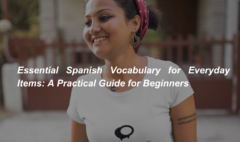Mastering Spanish Interrogative Words: Unlocking the Power of Questions
Mastering Spanish Interrogative Words: Unlocking the Power of Questions
Spanish learners often encounter various interrogative words that are fundamental for asking questions. Understanding these words and their nuances is key to mastering the language. In this blog post, we’ll delve into the specifics of quûˋ, cuûÀl/cuûÀles, cuûÀntos/cuûÀntas, dû°nde, and cû°mo.
1. Quûˋ (What): “Quûˋ” is a versatile interrogative word used to inquire about objects, actions, or ideas. For instance, “ô¢Quûˋ quieres comer?” translates to “What do you want to eat?”
2. CuûÀl / CuûÀles (Which): “CuûÀl” and “cuûÀles” both mean “which” but differ in singular and plural contexts. “CuûÀl” is singular, like in “ô¢CuûÀl es tu libro favorito?” meaning “Which is your favorite book?” while “cuûÀles” is plural, like “ô¢CuûÀles son tus hobbies?” meaning “Which are your hobbies?”
3. CuûÀntos / CuûÀntas (How Many): These interrogative words refer to quantity. “CuûÀntos” is used for masculine nouns, as in “ô¢CuûÀntos aûÝos tienes?” meaning “How many years old are you?” while “cuûÀntas” is for feminine nouns, as in “ô¢CuûÀntas hermanas tienes?” meaning “How many sisters do you have?”
4. Dû°nde (Where): “Dû°nde” is essential for asking about location. For instance, “ô¢Dû°nde estûÀ el baûÝo?” translates to “Where is the bathroom?”
5. Cû°mo (How): “Cû°mo” is used to ask about manner or means. For example, “ô¢Cû°mo estûÀs?” means “How are you?” focusing on someone’s well-being.










